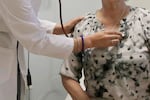
FILE - A doctor examines a patient at a clinic in Stanford, Calif., on April 9, 2019. A University of Oregon study finds patients' trust in doctors diminishes when political views clash, highlighting how partisanship can affect health care outcomes.
Jeff Chiu / AP
New research from the University of Oregon reveals that a person’s political beliefs affect the trust they have in their own doctors and health care providers.
During the COVID-19 pandemic, UO political scientist Neil O’Brian started thinking about health and politics. Witnessing the partisan response to masking and vaccines, he wondered just how far distrust in medicine might extend.
O’Brian conducted surveys, randomly sampling nearly 2,000 people. One question that was asked was, “Who did you vote for in 2020?” Another question was, “Have you seen a primary care provider in the last 12 months?”
O’Brian revealed the findings: “People on the right are reporting less trust in their own primary care provider, less trust in their child’s pediatrician, less trust in the medical staff in an emergency room than those on the political left,” he said.
If people don’t trust health professionals, it’s a lot harder to solve health problems. This division in trust has significant implications for health outcomes as it affects patients’ willingness to follow medical guidance, which is crucial for managing health conditions and improving life expectancy.
The U.S. life expectancy declined in the early 2020s, which the CDC says “can primarily be attributed to deaths from the pandemic.”
At the start of his research, O’Brian said he looked at some older, publicly available data to get a baseline. In the 2010s, O’Brian said trust in major institutions like the military, education and the press was divided along party lines. But there was always one exception: medicine.
“And then in 2020, that broke along partisan lines,” he said. ”So, the Democrats became more confident, more trusting in medicine that Republicans. In the paper we talk about it [like this,] ‘COVID interrupted one of the last bipartisan consensuses in the U.S.‘”
O’Brian argued that the partisan divide in trust in personal doctors was a response to COVID-19, a COVID spillover effect, if you will.
Doctors are acutely aware that distrust in health care has been growing. Where once the predictors for distrust of one’s personal health care provider might have been race, education, age or having health insurance, now the strongest predictor is who the patient voted for in the 2020 election.
“I think that is really compelling,” O’Brian said.
O’Brian’s future research will explore the factors that inspire patients’ trust in their doctors. He also will investigate what the trust gap in doctors means for health outcomes and if the data show different health outcomes for Republicans and Democrats.
Last May, Neil O’Brian was honored as a 2024 Andrew Carnegie Fellow. He co-authored the research paper with independent researcher Thomas Bradley Kent. It recently appeared in the British Journal of Political Science.
Tiffany Eckert is a reporter with KLCC. This story comes to you from the Northwest News Network, a collaboration between public media organizations in Oregon and Washington.
It is part of OPB’s broader effort to ensure that everyone in our region has access to quality journalism that informs, entertains and enriches their lives. To learn more, visit our journalism partnerships page.